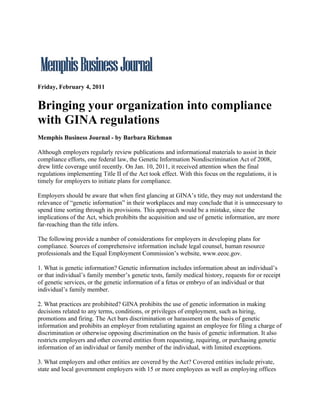
Memphis Business Journal.Compliance With Gina Regulations
- 1. Friday, February 4, 2011 Bringing your organization into compliance with GINA regulations Memphis Business Journal - by Barbara Richman Although employers regularly review publications and informational materials to assist in their compliance efforts, one federal law, the Genetic Information Nondiscrimination Act of 2008, drew little coverage until recently. On Jan. 10, 2011, it received attention when the final regulations implementing Title II of the Act took effect. With this focus on the regulations, it is timely for employers to initiate plans for compliance. Employers should be aware that when first glancing at GINA’s title, they may not understand the relevance of “genetic information” in their workplaces and may conclude that it is unnecessary to spend time sorting through its provisions. This approach would be a mistake, since the implications of the Act, which prohibits the acquisition and use of genetic information, are more far-reaching than the title infers. The following provide a number of considerations for employers in developing plans for compliance. Sources of comprehensive information include legal counsel, human resource professionals and the Equal Employment Commission’s website, www.eeoc.gov. 1. What is genetic information? Genetic information includes information about an individual’s or that individual’s family member’s genetic tests, family medical history, requests for or receipt of genetic services, or the genetic information of a fetus or embryo of an individual or that individual’s family member. 2. What practices are prohibited? GINA prohibits the use of genetic information in making decisions related to any terms, conditions, or privileges of employment, such as hiring, promotions and firing. The Act bars discrimination or harassment on the basis of genetic information and prohibits an employer from retaliating against an employee for filing a charge of discrimination or otherwise opposing discrimination on the basis of genetic information. It also restricts employers and other covered entities from requesting, requiring, or purchasing genetic information of an individual or family member of the individual, with limited exceptions. 3. What employers and other entities are covered by the Act? Covered entities include private, state and local government employers with 15 or more employees as well as employing offices
- 2. (e.g. Congress), employment agencies, labor organizations and joint labor-management committees. 4. Who is protected under the Act? GINA protects job applicants, current and former employees, apprentices and trainees, and labor union members from discrimination based on their genetic information. 5. What are GINA’s confidentiality requirements? Employers that possess genetic information about applicants or employees must generally keep the information confidential. Any documents containing genetic information must be kept apart from other personnel records and in a separate medical file effective Nov. 21, 2009. 6. Will “water cooler” conversations sharing genetic information violate GINA? It will not violate GINA if a manager or supervisor overhears a conversation between co-workers about genetic information. For example, one employee may tell another that her mother has breast cancer or that she has been tested to determine if she has a gene that would increase her risks for the disease. This exception applies to other discussions about general health. It does not apply if the supervisor asks probing questions that are likely to elicit genetic information. 7. Will employer-offered wellness programs that obtain genetic information violate GINA? It generally will not be a violation if genetic information is obtained about an employee or the employee’s family members on a voluntary basis and if the individual receiving the services had provided prior knowing, voluntary and written authorization. Financial incentives can be offered for completion of health risk assessments as long as the incentives are available irrespective of whether questions regarding genetic information are answered. 8. Will the employer be liable if genetic information is acquired from social networking sites and other sources that are commercially and publicly available? An employer generally is not liable for acquiring genetic information from newspapers, books, movies, magazines, periodicals, television shows, or the Internet as long as the search was not for the intent of finding this information. 9. How does GINA impact requests for medical information? Employers that inadvertently acquire genetic information in response to lawful requests for medical information (e.g. Family and Medical Leave Act certification) will not violate GINA if the individual and/or health care provider releasing the information was directed not to do so. The regulations provide “safe harbor” language that employers are encouraged to use for notification purposes. 10. What measures should employers consider adopting for compliance purposes? Employers should consider revising equal employment and harassment policies to prohibit harassment, other discrimination and retaliation based on genetic information; training management regarding the Act and their responsibilities; incorporating the “safe harbor” language when requesting medical information; developing a record-keeping process that addresses confidentiality issues; and posting notices that outline pertinent information and rights under GINA.
- 3. BARBARA RICHMAN is a senior consultant with HR Mpact, a Memphis human resource consulting firm. She can be reached at (901) 685-9084, (901) 496-0462 or barbara@hr- mpact.com
